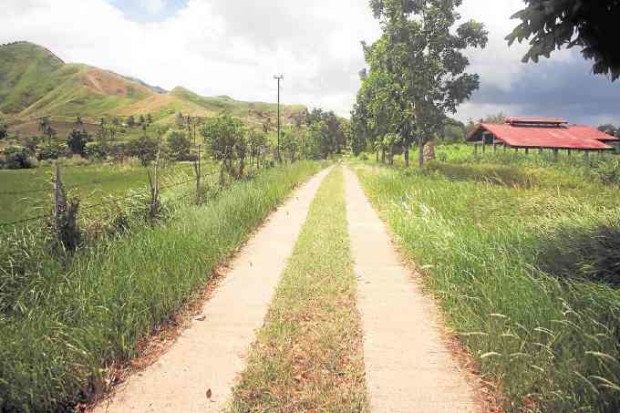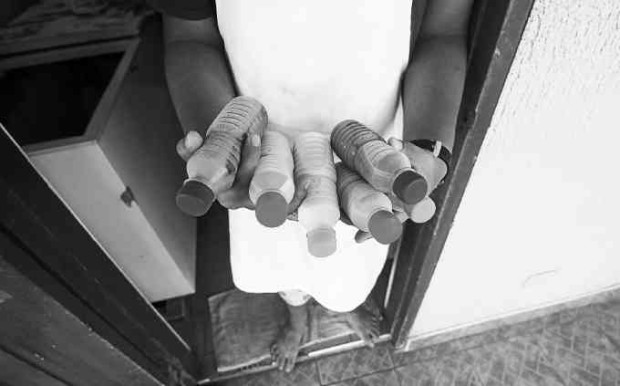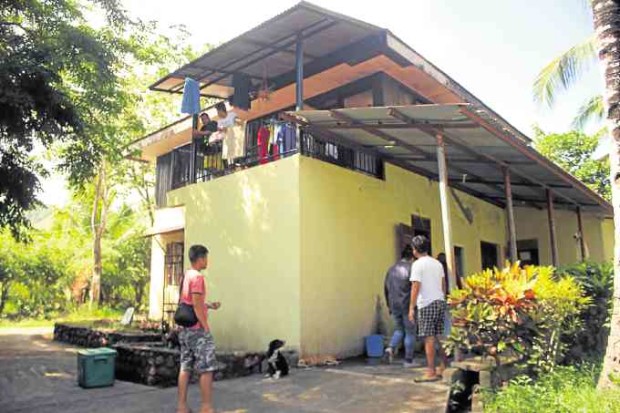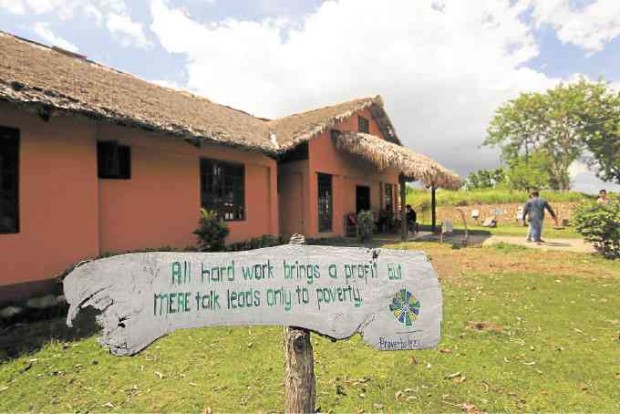A harvest of hope

Fazenda da Esperança, located in the middle of open grasslands and hills in Masbate province. —Photos by Shan Gabriel Apuli
MILAGROSA, Masbate — With no enclosures or fences girding the sprawling 300-hectare farm in this town in Masbate province, Fazenda da Esperança (Farm of Hope) or Fazenda, could be mistaken for a resort, with its cabana-type quarters surrounded by bushes, trees, flowering plants and a manicured lawn.
The serene surroundings, however, conceal the farm’s real mission—that of putting order and hope into the turbulent lives of people seeking to stop their addiction to drugs, alcohol, gambling and sex, and the behavioral problems that come with such vices.
Established here in 2003, Fazenda originated from Brazil 33 years ago and was inspired by the Focolare Movement to help drug addicts change their ways through work, spirituality and community. Fazenda has since spread in different parts of the world and reached the Philippines via the Masbate facility.
The Focolare Movement, founded by Chiara Lubich in 1943 in Italy as a means to survive World War II, promotes the ideals of unity and brotherhood, the same ideals that bind Fazenda residents. Unlike other rehabilitation facilities, the Catholic Church-run Fazenda does not impose restrictive regulations on its residents who are, however, forbidden from keeping and using mobile phones in the farm.
The farm in Masbate started with 352 ha of land donated by a Foccolare priest, Fr. Piereno Rogliardi. Since then, Fazenda has transformed 252 hectares of its land into a community with three houses for males under its program; three houses for missionaries, volunteers and sisters, respectively; a beautiful chapel where Mass is held daily as long as a priest is available; a spacious multipurpose hall for various events and an original milking house where neighbors line up early in the morning to buy Fazenda’s most popular product: flavored or unflavored cow’s milk.
Suicide attempts
Among the 32 Masbate residents in the facility is Brandon (surname withheld to protect his privacy), 37, who had attempted suicide thrice while working in the police force, which he joined after quitting a teaching job. The first suicide try left a bullet scar on his skull while blade scars on his wrists are evidence of earlier suicide attempts.
Brandon, who is a step away from finishing his yearlong healing program, recalled becoming an alcoholic, suffering from depression, and being suicidal after his girlfriend left him for another man. The emotional roller-coaster led him to self-destruction.
His daily regimen of farm work at Fazenda, however, served as therapy, the rush of activities pushing away negative thoughts and energy.
Residents in the facility regularly reflect on Biblical passages and Christian teachings to cultivate the pillar of spirituality, Brandon said. “I have learned to make God the center of my life, which I believe would always lead me to do good,” he added.
Residents who have finished the program become facilitators who assist and counsel other residents in their activities and tasks. Among them is Dindo, 50, who manages the production of pasteurized milk and mozzarella cheese processed in the farm.
The facility also grows organic vegetables that they sell to sustain operations.
Temptation
Gian, 33, said his 10-month stay made him resolute to finish his one-year healing program at Fazenda, despite the persistent temptation to back out during his early months as resident.
His addiction to “shabu” (methamphetamine hydrochloride) ruined his relationship with his girlfriend and family and burdened his parents, he said, so he decided to enter the facility in June 2016 on his father’s birthday.
Things were initially difficult since he was not used to manual work, mused Gian, who used to have a good-paying job in a multinational corporation before he was fired for negligence.
He looks forward to finishing the program as a birthday gift to his father on June 25, but he does not intend to leave Masbate to avoid a relapse, he said. “I want to stay in a new place where I can choose new friends and people to deal with,” he added.
After a 29-year struggle with drugs, Edward Yosores Jr., 40, has been sober for two years now and was offered a job to administer and manage another Fazenda, a smaller facility in Naga City in Camarines Sur province that operates in a 7-ha farm.
The Fazenda in Naga has a maximum capacity of 12 residents and was put up in partnership with the Archdiocese of Caceres.
Yosores believes that drug addicts understand themselves better. But it doesn’t hurt to spend at least eight hours on work in the farm, as well as on prayer, reflection and a sharing of experiences while in the facility, he said.
Typical schedule
A typical Fazenda schedule starts with waking up at 4 a.m., breakfast at 5:30, meditation and Bible reflections at 6:15, a break at 9, and farm work until 11:45 a.m. Lunch and siesta follow until 2 p.m., after which it’s back to farm work until sundown.
Monday nights are devoted to sharing experiences about how they practice the three pillars of Fazenda—work, spirituality and community, while Tuesdays are for catechism. On Wednesday, residents share the “word of life,” a selected passage from the Bible.
“For example, if we have chosen ‘act of love,’ a resident can share how he practiced it. A resident may have gathered another resident’s clothes drying in the sun when the rain comes,” Yosores said.
Residents do their daily routine on Thursdays, and on Fridays, they watch movies together—usually inspirational films. “But we don’t watch news [programs],” Yosores said.
There’s half-day work on Saturdays—and on Sundays, rest and a Mass celebrated together.
K, another former addict, heard about Fazenda from another addict and the father of her youngest son.
She recalled hitting rock bottom, with only a piece of Spanish bread, an unpaid motel bill, and a cellular phone. She split the bread so she could have it for breakfast and dinner, and left her phone at the motel as collateral for her bill.
Finally, with nowhere else to turn to, she returned home: the one place she had been trying to escape through drugs since she was 17. She was 34 then and unwilling to fill the gap she had with her sister and parents.
Trauma
She had expected the worst when she returned home in 2014, perhaps a pair of handcuffs and a trip to the rehabilitation center. She was relieved that she was instead brought to Fazenda where the most critical element of rehab is the person’s decision to change. Openness and the willingness to change are key to the person’s successful turnaround, said K who, in over two years, supported her two kids as a writer.
Fazenda has changed her, K added. She used to be numb to the hugs of her kids. Today, their hugs delay her from leaving the house, and give her enough reason to hurry home when work is done.
At Fazenda, K helps coordinate the weekly meeting of the facility’s graduates. She has become its ambassador of hope.
It’s a change that A herself feels despite the trauma of having six of her friends killed in the government’s war on drugs, and of learning about her boyfriend’s murder two days before Christmas. But unlike those who seek retribution for crimes committed against them, A has left everything to God. “God will render judgment on them,” she said.
What gives her strength to continue in the program is the desire to prove that authentic change is possible—even for addicts like her who has been using drugs since she was 13. A is now one of two coordinators in the house who makes sure work schedules are followed faithfully and food distributed equitably.
In a house where residents deal with painful traumas (including human trafficking, which ultimately led to their drug addiction), the challenges of living together in harmony is a daily struggle. But it is also good training for dealing with the challenges of the outside world.
In January, in a Mass celebrated by Luis Antonio Cardinal Tagle, four more Fazenda graduates became ambassadors of hope. Four may not be an impressive number, but it was a historic moment for the over 100 residents who overcame the logistical challenge of traveling together by bus, boat and van for an 18-hour journey. They were joined by Fazenda founders Fr. Hans Stapel, Nelson Giovanelli, Iraci Leiti and Luci Rosendo, who had flown in from Brazil for a visit.
It was a community in solidarity against the extrajudicial killings of drug addicts. Four lives saved against the thousands killed may not seem much, but for Fazenda founders and residents alike, each individual life matters, each a harvest of hope.

















